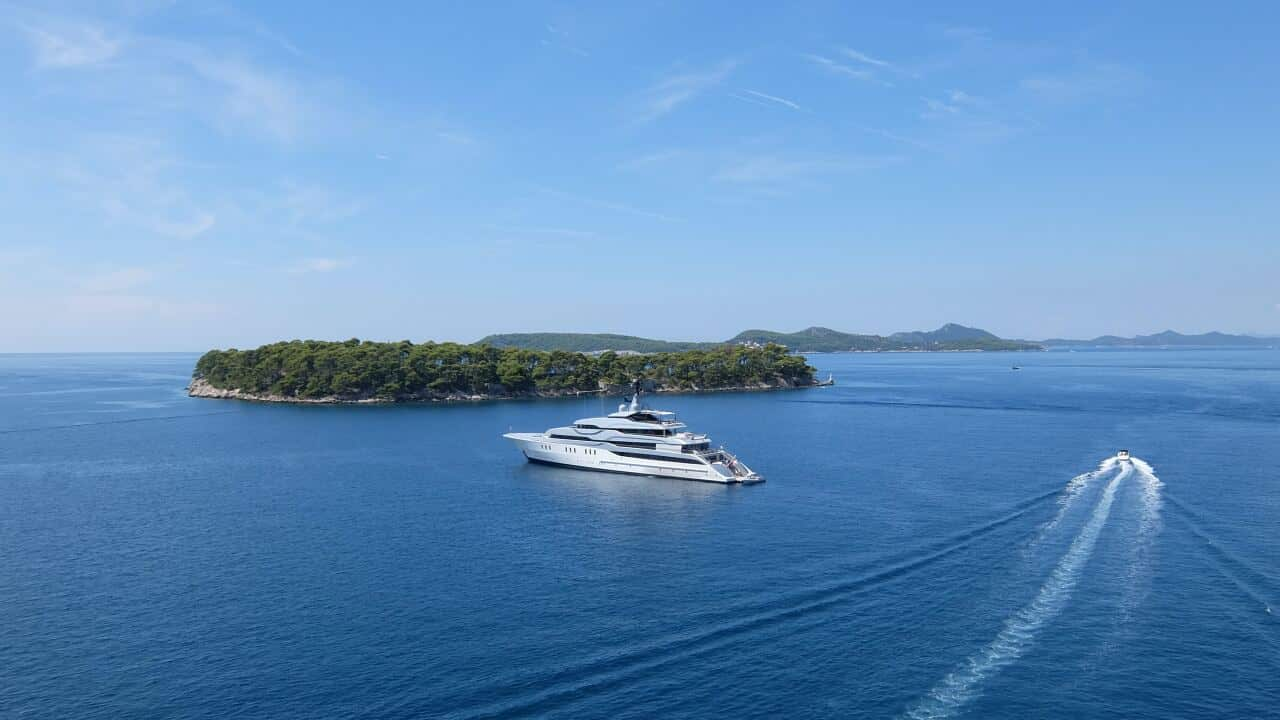Private islands boast the potential to house big dreams and even bigger schemes, and the clientele buying them has changed since COVID-19, according to one island agent from Queensland.
Yes - while the country is grappling with a cost of living crisis, and housing affordability shock, there is an actual market for buying yourself an entire island. For less than the cost of a studio apartment in Sydney you can - though it's a bit tricky to access.
So we at The Feed thought: we should check this out. Who's doing this? How does it work? And is this really a slice of paradise or could private sales be a security or environmental risk?
The man who sells islands
First stop: Richard Vanhoff. He's been in the island market for around two decades and says he’s one of three people in the world who sell islands.
“I handle all of the Pacific,” he says, although islands are also advertised through your everyday real estate agency.
Mr Vanhoff spoke with The Feed in between meetings with prospective clients — he's often island hopping showing them what's on the books.
And while he's constantly hanging around islands and resorts, "it's really down to business."
"When you introduce somebody to an island, and they eventually buy it, it's like releasing a child, kicking them out the door, and they're on their own," he says.
"But you've got to visit them every now and again to make sure they're doing okay. And that's what island life is like."
Who buys private islands?
It appears it became a bit of a thing during the pandemic.
According to Mr Vanhoff, the popularity of island ownership has kicked off recently. He says he’s received more inquiries in the past 12 months than the two or three years before COVID-19.
“Previously I was dealing with people wanting to get away from the world, or they've got too much inheritance,” he says.
“It was a prestige thing.”

It's fair to say island ownership is generally beyond the realm of the average person.
Yet the realm of possibilities for those with the capital seems to have no limits. Vanuatu’s Satoshi Island - technically called Lataro - is being promoted as a sustainable smart city and “the first real-world crypto economy,” soon ready to welcome in entrepreneurs and holidaymakers.
The island's new name harks to the mysterious inventor of bitcoin, Satoshi Nakamoto.
But it’s not all crypto and cocktails. There are legitimate concerns about the management of otherwise pristine pieces of land. Off the coast of Cairns, Double Island has gone derelict, and its Hong Kong-based billionaire owner has been given an ultimatum by the Queensland Government to bring it back up to scratch.
And for this, there is some form of safeguard via ownership rules: leasehold, meaning the land is rented long-term from the government, and freehold, meaning the land can be owned outright (though it still remains territory of the relevant government and country.) Because of this, relevant governments do have oversight.
What do people spend to secure private islands?
Mr Vanhoff has islands for sale from anywhere between $1 million to $80 million. Some come with houses ready to go, while others boast resort facilities, influencing the price tag — and potential profit.
He says the island market isn’t affected by the housing market in the same way you might expect. He says people spending millions of dollars on a house are going to look for the best value.
"And sometimes, the best value may be a waterfront in the middle of the ocean, rather than the waterfront in Sydney Harbour or Brisbane."
He regularly takes prospective clients out to inspect islands but has had to grapple with “a lot of crackpots,” in the past.
“They've had a clairvoyant said, ‘You're gonna win lotto.’ So they've gone out and they've wasted my time for a day-and-a-half on the premonition of, ‘We're gonna win lotto’.”
Are privately owned islands a threat to our national security?
Some concerns have been raised about whether island ownership could be a threat to national security.
The Conflict Islands in Papua New Guinea are up for sale, ready to buy from entrepreneur owner Ian Gowrie-Smith. Last year, A Current Affair speculated the coral atoll made up of 21 islands “have the potential to provide navy and airforce footholds just 940 kilometres from Cairns”.
“There’s nothing stopping China snapping them up,” the program reported.
But William Stoltz, an expert associate of the National Security College of the ANU, explains the threat is unlikely.
While The Conflict Islands were strategically important in World War One and Two, he says the reality is, “they are very, very small, and the capacity to develop them is quite limited.”
As the landmass is so small, Mr Stoltz says the ability to establish and maintain a military presence on the Conflict Islands would be “very, very difficult”.
“We would have a fair degree of warning time before something like that happens – you can't set up a naval base or a listening station overnight,” he says.
What about climate change?
As we all grapple with the , will private island owners see their assets lost to swelling seas? Five Pacific islands have been lost to rising sea levels due to climate change, and NASA’s satellite records show the rate of sea level rise is increasing – the average global sea level rose by 0.27 centimetres from 2021 to 2022.
Despite such reports, Mr Vanhoff believes climate change and rising sea levels aren’t of concern to his clients, and notes most Australian islands are on rock.
“Most of them are anything about five metres above the AHD [] or the high watermark.”
What does it cost to maintain a private island?
So, if you think you're in the market, you'll have to consider access, construction costs and basic amenities.
And island properties are likely to take a little more maintenance than a residential home in the suburbs due to the surrounding salt water. But Mr Vanhoff assures some non-corrosive building techniques can withstand the salt. That said, he believes it can be helpful to have a groundskeeper to ensure the property is kept in good nick.
“Owners don't always live on the islands,” Mr Vanhoff explains.
“The intent may start out that way, but they'll end up from time to time doing a swap for the mainland. But generally speaking, if you've got some external assets on there that are worthy of maintaining then you would put a caretaker on board.”
So you might just need a part-time groundskeeper and a million bucks or more to spare. Plus a boat to get there.












